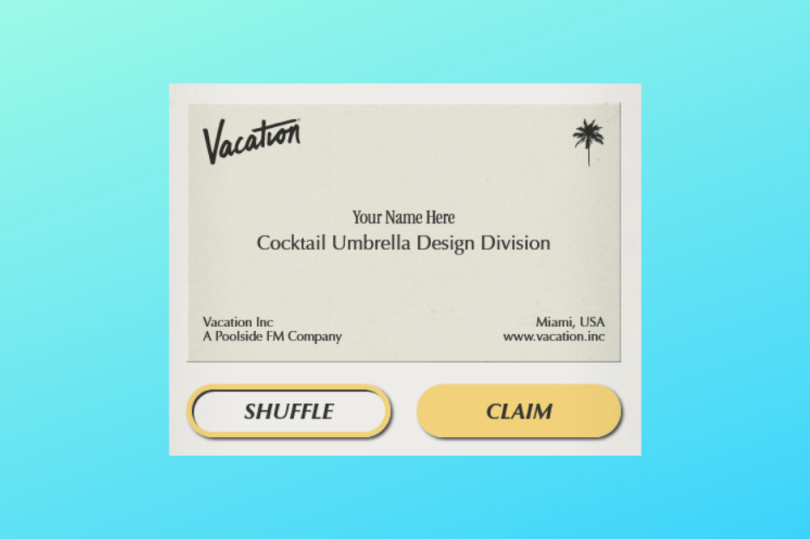I recently landed a job as a tiki bar mug manager. I got the gig by tapping “shuffle” on a random job-title generator hosted by Vacation, a new sunscreen brand created by retro internet radio station Poolside FM.
The online generator had already offered me “chief golf cart consultant,” “hammock inspector” and “ice cream buffet organizer,” but I kept shuffling until I found my preferred title. Once it appeared, all I had to do to claim it — and receive a commemorative business card for social media sharing — was hand over my cell number.
More than 12,000 other people handed over their numbers too.

The viral interactive content campaign, which launched last month, was a way for the company to raise awareness of its new sunscreen without having to spend a dime on paid advertising.
And more importantly for the long term, perhaps, the campaign allowed the company to capture the numbers of thousands of consumers, with whom it now enjoys a direct line of communication.
Why a Radio Station Is Getting into Sunscreen
Poolside FM is a web radio service that plays summery, synth-forward pop tunes. Its pixely, pastel-colored interface features early-Microsoft-style icons and a video feed of grainy 1980s home movies, hearkening back to an era of big hair and short shorts.
Poolside FM became available as an iPhone app in 2020, and features a handful of curated stations to choose from, including “Indie Summer,” “Tokyo Nightclub” and “Friday Nite Heat.”
Tech entrepreneur Marty Bell created the nostalgia-drenched music player in 2014, initially conceiving of it as a Soundcloud stream. It has since developed a cult following, with a listener base that has swelled into 700- or 800-thousand people contributing to over a million listening sessions a year, Bell told Built In.
All this growth occurred despite Bell regarding Poolside FM as a side project, as he devotes the bulk of his focus to his startup, Nude: a U.K.-based fintech company that helps consumers save up for their first-time house purchases. And as Poolside FM has grown, Bell said it has gotten too big for him to manage — especially since it has been without a clear monetization strategy (Poolside FM’s merch shop has been its only revenue source to date).
“It’s kind of an ongoing joke that Poolside FM doesn’t make money, that it just loses money all the time,” Bell said.
Over the years, potential investors and business partners have approached Bell with suggestions for how to effectively monetize the Poolside FM community. A beer brand was mentioned at one point, as was a swimwear line. But to Bell, such brand extensions felt like he’d be slapping the Poolside FM name on things that didn’t quite match. He spent seven years building brand equity, and he didn’t want to squander it on a potential misfire.
Bell eventually connected with entrepreneurs Lach Hall and Dakota Green, who had already been developing a sunscreen. Together they hatched the idea of extending the Poolside FM brand into a suite of products under the name Vacation. They would start with a sunscreen and a sunscreen-scented fragrance, which they’d sell directly to consumers.
Why sunscreen? Bell finds it uniquely nostalgic. Something about a tube of creamy, coconut-scented SPF 30 lotion rings true with Poolside FM’s retro summer-fun vibe — an essence other proposed brand extensions had fallen short of capturing.
“[Vacation] is designed for these people who absolutely love what we’ve been building and iterating on [with] Poolside FM for seven years now,” Bell said. “The purpose of the campaign specifically was to make it very clear to the Poolside FM audience that we had built something for them.”
Lowering CAC with a Viral Campaign
Building a direct-to-consumer CPG brand from scratch and bringing it to market is awfully expensive, and typically involves lots of paid ad spend (think of all the Instagram ads for skincare products you see).
To growth-hack its way into lower customer acquisition costs, Vacation trojan-horsed its sunscreen pre-order page inside an inherently talkable experience.
First, it shared the job title generator with its existing audience: Poolside FM listeners were prompted to visit Vacation’s landing page upon opening the app or booting up the website. There, they were given a chance to claim an honorary role for themselves (and receive perks) in exchange for their names and numbers.
The campaign was calibrated for organic discovery too, attracting people previously unfamiliar with Poolside FM. Thousands of digital business cards embossed with honorary titles — from jacuzzi vibe check officer to head of champagne snorkeling — were shared across Twitter and Instagram, Hall said. Some people even updated their LinkedIn profiles with their new honorary Vacation roles.
Within 24 hours, the campaign resulted in the collection of thousands of cell phone numbers, the company said. (It declined to share how many sunscreen pre-orders were ultimately made).
“Our whole approach to marketing this business is about … reducing cost per acquisition, offsetting the paid media costs that have become very expensive, [with] buzzworthy, creative drops,” Hall said. “We were able to get twelve and a half thousand people on that virality.”
The campaign was all about “data capture,” Hall added. “Now we have a very fun way to interact with the community one on one.”
To wit: After punching in my number, I received a text message from Vacation regional sales director Ray Smith (presumably not a real person), who warmly welcomed me to the company. Ray furnished me with a referral link (if three people use it to buy Vacation sunscreen, I get a free tube) and directed me to Vacation’s Instagram account, which, the company told me, garnered more than 4,000 followers on launch day.
Monetizing and Mobilizing Communities
“Curating an audience is an involved process with long-tail benefits and short-term headaches,” brand investor and advisor Web Smith wrote for 2PM in 2019. “Marketing executives have long underestimated the value of this approach to community development and marketing.”
Vacation by Poolside FM’s marketing is designed to create a series of “buzzworthy drops” to move people from the top of the funnel down into what Hall calls “sticky communities.”
These sticky communities include the Poolside FM iPhone app, the company’s newsletter subscribers and the “honorary employee CRM program” (composed of the individuals collected through the job-title generator).
Once users are in these communities, Hall said, “we can engage with them over time, and have a better chance of being able to sell them products and increase [lifetime customer value].”
Sunscreen was only the first of multiple physical products Vacation has on its roadmap. It dropped its sunscreen-scented fragrance line, “Vacation” by Vacation, just this week. And it’s not hard to imagine a future in which Vacation rolls out additional, on-brand products.
When it does so, it’ll have a five-figure rolodex of SMS contacts toward which it can push ads and promotions, potentially saving the company lots of money it would otherwise spend acquiring users through search and social ads. It’s a strategy for sustainable growth and customer retention, built on the back of Poolside FM’s long-brewing community.
And it’s not just customers that Vacation has in its database. It’s also a workforce of brand ambassadors who are willing to play along as the company’s honorary employees and use word-of-mouth to help the brand grow.
There are plans for using the SMS list to send users interactive narratives, encouraging them to engage further with the brand and live up to their roles as honorary employees of the company. And there are tentative plans for a community space where these individuals can talk to each other.
“That’s the dream for us,” Bell said, “building entertainment x commerce that everyone feels a part of.”




